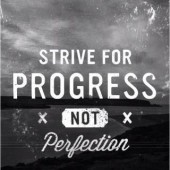Mental Illness: Why Do We Feel Alone in Our Struggle?
Okay. Take a minute and think about it. What comes to mind? Immediately, I think of when I was first diagnosed with bipolar disorder. And then I recall the years that followed: a feeling of loneliness that never seemed to leave me. A feeling I still struggle with. Even as I write these words and with the understanding that those who read them probably do understand. But it's not that easy--it never is.
Feeling Alone Before the Diagnosis of Mental Illness
 Yes, before. I don't know about you, but before I was diagnosed with bipolar disorder and later addiction, I felt alone. I felt as if nobody really understood why I acted the way I did. I had no idea why I acted the way I did. I was certain that I wanted it to stop. I wanted to act like I thought I should, like I thought other normal people did.
Yes, before. I don't know about you, but before I was diagnosed with bipolar disorder and later addiction, I felt alone. I felt as if nobody really understood why I acted the way I did. I had no idea why I acted the way I did. I was certain that I wanted it to stop. I wanted to act like I thought I should, like I thought other normal people did.
Before the diagnosis, we feel alone because we know something is different about us. Something is a little off. Or maybe we don't know, but people we love tell us. Either way, it's a lonely feeling.
Feeling Alone When First Diagnosed
Those of us diagnosed with a mental illness understand the immediate feeling of loneliness. Suddenly we have an illness! A mental illness! Suddenly we feel stigma and have to take medication and follow directions and...Well, the list goes on. Our mental health team will tell us we are not alone--easy for them to say sitting across from their lovely oak desk with our file in their educated hands!
Mental illness is common, one in four people struggle at some point in their lives, but it does not change an innate feeling of suddenly being alien to the world. I don't know about you but I don't really like standing in line at the pharmacy for medication, but that's part of self-care, and that ensures we become well and stay well--stable.
Feeling Alone When Working to Find Mental Health Stability
When we work to find stability-- certainly not an easy feat--we might feel alone because becoming well is a lot of work! Work that mostly depends on our dedication to become well. After all, nobody (probably) is going to force medication down our throat or drag us out of bed. No, we suddenly need to take out health seriously. And that's lonely.
Accepting Our Illness and Allowing Ourselves to Feel Alone
 Feeling alone can be a good thing! Time spent reflecting and digesting allows us to take a look at our lives, our actions, and our health. But there is a difference between segregating yourself from those you love, and those who help you recover, than it is to allow ourselves time to feel---to feel alone.
Feeling alone can be a good thing! Time spent reflecting and digesting allows us to take a look at our lives, our actions, and our health. But there is a difference between segregating yourself from those you love, and those who help you recover, than it is to allow ourselves time to feel---to feel alone.
I compare it to the end of long-term relationship. It hurts at first. but slowly you become more comfortable being alone, getting to know yourself outside of the confines of another person. You grow and you change.
To use an old adage: progress not perfection. Allow yourself to feel alone sometimes--just not too often.
APA Reference
Jeanne, N.
(2012, September 13). Mental Illness: Why Do We Feel Alone in Our Struggle?, HealthyPlace. Retrieved
on 2026, March 5 from https://www.healthyplace.com/blogs/recoveringfrommentalillness/2012/09/mental-illness-why-do-we-feel-alone-in-our-struggle
Author: Natalie Jeanne Champagne
1 in 4 of U.S. has a diagnosis of mental health. Huge numbers and huge responsibility on the mental health community.
Politically, we need to recognize that we are alone, so we can move on to the next step.
We don't have the familial support that DD has; Independent Living looks at mental health as the bottom of the hierarchy spectrum they created; Psychiatrists and pharmaceutical companies are making huge profits off us using hunt-and-peck methods though Personalized Medicine exists.
Every State has made cuts to Mental Health Services. New Medicaid will start without grievance processes. Only 3 States have their required ADA Coordinators. No State has the required published grievance process. Elected Dems and Reps alike use terms like "unfunded mandates" to pretend they don't receive federal dollars.
Voting is still not accessible to all Americans with Disabilities and States are actively and quietly attacking legislation and voting processes to prevent you from voting.
President Obama and AG Holder quietly, without public discussion, wrote out our only effective tool for grievance out of 1991 ADA Title II, this year,...that each complete complaint be investigated...AND watered down States' responsibilities to Americans with Disabilities, where we live and receive our Medicaid...all the while Congress looked the other way.
Our legal advocacy organizations are co-opted because they receive federal grants and are conflicted when it is time to step up; Advocacy organizations, are now "sophisticated" and wish to lobby and inform...draining away litigant dollars, which is where we are in the stage of Disability Laws...in the enforcement stage.
A Decade after Lane has been decided in the Supreme Court, County Courthouses, nationwide, still fight over making their courts accessible to Americans with all Disabilities.
There is a war on Americans with Disabilities against their rights to FILE complaints in Courts. In California, right now, US Senator Dianne Feinstein has written a letter threatening California that if they don't change disability law she will. California has responded by creating legislation that punishes attorneys for filing, places people with disabilities on a list that must get permission to sue, if successfully sue a business, the business will be exempt from ever being sued again.
Supreme Court Justice Scalia has layed out all the holes in Disability Law and collectively the Justices have stated that they know the problems of enforcement of Disability Law but will not act to overcome Due Process problems...a Constitutional issue for 1 in 4 Americans with mental health plus all the other diagnosed disabilities.
We are alone...we know because we live it.
Our political action determines how we will be treated. What are we going to do now?
Hi, Belinda
What an important and educational comment. I agree with much of what you have said. In layman's terms: I do agree that more support for mental health, disabilities, is needed in many areas and this is not usually recognized. The political aspects of it are messy to say the least; persons with disabilities often feel alone but as you wrote "We are not alone...we know because we live it" This could not be more true and for those that do not live with a disability, the guys up top, disability awareness is not nearly as recognized as it needs to be for society to advance in a positive and productive direction.
Thank you for sharing with our readers,
Natalie